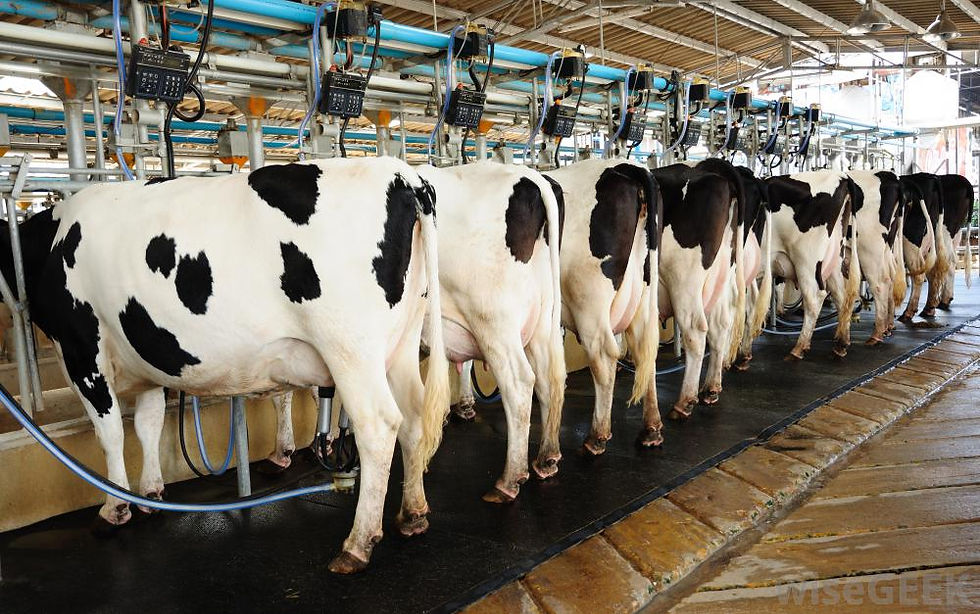Got Milk? - The harsh reality of the Dairy Industry
- Mustapha Simpson

- Nov 23, 2020
- 4 min read
"We feel entitled to artificially inseminate a cow and when she gives birth, we steal her baby, even though her cries of anguish are unmistakable; and then we take her milk that's intended for her calf and put it in our coffee and our cereal"
Several months ago, Joaquin Phoenix stood on the Oscar stage and accepted the 'Best Actor' accolade for his performance in 'Joker.' Usually, when someone wins the prestigious award, they would come up and thank all the people that played a role in their success; but Mr. Phoenix had something slightly different in mind. In an emotional speech, he called out many key issues that we are facing as a species today, most notably our exploitation of the natural world and those who dwell in it. So what's the deal with Dairy and why do we really need to drink milk?

What's polarizing about Joaquin's statements is how few people are aware of this fact. I for one lived much of my life being of the impression that cows just gave milk because they had it to give. I actually believed that these animals were mostly happy where they were and that milking them was necessary; an avenue to get the essential vitamins and nutrients that we need to grow and be healthy. That couldn't be further from the truth.
This kind of thinking can be credited to the billions of dollars spent on ads by the dairy industry, brainwashing us into thinking any of that even makes sense. Before the advent of the internet, it was pretty easy to perpetuate this false narrative to consumers. Now, we know a lot more about what they do and how they do it. In fact, we know too much, and that's a major problem for them. How come when advertising their farms, they always leave out the part where they inseminate the cows and take away their male calves to slaughter? Well, in their defense, that wouldn't sell much milk or cheese. Apart from the treatment of these animals, let's look into the fundamental lie that contributed to us purchasing milk in the first place.
During the first world war, the US sent milk overseas for the troops and because of the then growing demand, a drastic increase in production was needed. Dairy herds were grown significantly and production multiplied tenfold. However when the world wars ended, there was a problem. Demand dropped dramatically and production was outpacing it by a great margin. There was simply too much milk.
In stepped the US government and in collaboration with the industry, set out to increase consumption of milk by the general public. They came up with the idea that milk is important for our health and essential to development. This was followed by huge marketing campaigns and billions of tax dollars being poured into dairy. They even went so far as to make dairy its own food group.

The Calcium Narrative
So lets address the elephant (or cow) in the room. Calcium. The all-important mineral essential to strong bones and teeth that only comes from cows......right? Well, that's certainly how they make it seem. Calcium is very important no doubt, but its not exclusive to cow milk, and can be found in everyday foods like spinach, peas, beans, almonds, cabbage, oranges and soya. There are also foods which are fortified with it, such as plant-based milks, cornmeal and cereals. Check out more calcium-rich foods here.
Have you ever heard someone mention that they are 'lactose intolerant?' Lactose is the sugar component of the milk and is found in mammals' milk, including human breast milk. Most people, roughly 65%, have a reduced capacity to digest lactose after infancy. From what I can gather by this, it would imply that the human body is able to digest the lactose in our mother's breast milk as a baby; an ability we then lose as we have no real use for it when we get older.
According to Physicians Committee for Responsible Medicine, milk and other dairy products are the top source of saturated fat in the American diet, contributing to heart disease, type 2 diabetes, and Alzheimer’s disease. Studies have also linked dairy to an increased risk of breast, ovarian, and prostate cancer.

As you can see here, Dairy is by far the obvious worst choice when it comes to a sustainable milk option. Its emissions, land and water use all outweigh the alternatives. Coconut milk isn't on the graph but deserves an honorable mention here as its a very good option as well; especially when making your own milk from fresh Trinidad coconuts.
This topic could be quite complicated and there are so many false narratives floating about that seek to confuse the consumer. To me though, there is one question that truly simplifies things. Are we baby cows? That's who the milk is for. I don't see any animals drinking milk from another species and that's all there really is to it.
Sources:
https://www.wisegeek.com/what-is-a-dairy-farm.htm
https://www.healthline.com/nutrition/vegan-calcium-sources
https://medlineplus.gov/genetics/condition/lactose-intolerance/#:~:text=Approximately%2065%20percent%20of%20the,to%20digest%20lactose%20after%20infancy.




💚